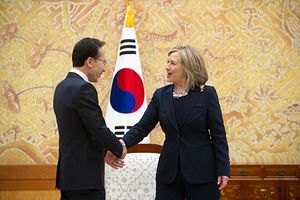If South Koreans could vote in the U.S. presidential election next month, Hillary Clinton would win by a landslide. More than 8 in 10 would throw their weight behind the Democratic candidate, who is surging in popularity both domestically and abroad, a survey released September 30 suggests.
In the poll of over 44,000 adults in 45 countries from August to September, WIN/Gallup International found that 82 percent of South Koreans would have voted for Clinton as the next U.S. president, compared to 3 percent backing her Republican opponent Donald Trump and 15 percent undecided or declining to answer.
South Koreans were Clinton’s third-strongest supporters behind only Finland and Portugal, which backed her 86 and 85 percent, respectively. The former first lady, senator, and secretary of state found support across the board, with Russia the only surveyed country preferring her business mogul rival and China nearly split on the candidates.
The poll found South Korea to be the most enthusiastic Asian supporter of Clinton, who played a major role in warming relations between Washington and Seoul. Pioneering the U.S. “pivot to Asia” policy as secretary of state for the Obama administration, she made South Korea one of her first overseas stops upon entering office in 2009 and worked closely to fortify economic and diplomatic ties with the key U.S. regional ally, which is wedged next to an increasingly powerful China and an erratic North Korea. Clinton has been especially vocal on continuing the six-party talks to denuclearize North Korea and backing the crucial Washington-Seoul military alliance to promote peace on the Korean Peninsula.
“She represents continuity and the credibility of the American alliance commitments to South Korea, whereas Donald Trump has made vague his commitments to the Baltics, Japan, and Korea,” political scientist Robert Kelly at Pusan National University in South Korea tells The Diplomat.
That is important for Asian cultures that favor stability and status quo over erratic wild cards, he adds. Standing in contrast to the lifelong politician is an unpredictable isolationist business mogul who has stoked fear and anger in South Korea for bashing the U.S.-ROK Free Trade Agreement as a “disaster” and suggesting Seoul should take on more of the cost burden for the U.S. military presence on the Peninsula. South Korea currently pays around 50 percent of the cost to host the 28,500 U.S. troops.
Seoul last week agreed to Washington’s request to construct a THAAD missile base in Seongju, southeast of the capital, to protect the United States’ own troops and bases in the South – at the cost of Seoul’s relations with China and political support from Seongju residents, notes Choi Lyong, a political science professor at Hankuk University of Foreign Studies in Seoul. He argues that Trump would not recognize such non-monetary efforts and sacrifice by the South Korean government.
“Trump’s lack of diplomatic sense destroyed the heart of Korean citizens, even conservative ones. They expect that Trump will demand more excessive efforts and contribution to South Korea,” he tells The Diplomat. “Clearly, Trump ignores the political and strategic influence on and contribution of Korea and Japan to American strategy in Asia-Pacific region for rebalancing against China.”
Despite Clinton’s aggressive pivot toward Asia as secretary of state, however, the U.S. policymaking environment has grown so inward-looking as domestic issues take the election stage that there may be little she can do to reverse that sentiment. While the poll found that only 16 percent of global voters hoped the next U.S. president would put America first over global interests, 61 percent of U.S. citizens favored an American-centric policy. Rather than try to strengthen or sustain its global prowess, the United States may retrench in its foreign policy.
Kelly argues that the weakest point of pivot-related diplomacy is U.S. public opinion, which focuses on Latin America for immigration and the Middle East for security issues, despite the Obama administration’s efforts to center its attention on the Asia-Pacific. Clinton will be forced to handle issues in Iraq and Syria, including the Islamic States, inevitably shelving momentum for Asian diplomacy.
“She’ll stand by the pivot, she’ll say the right things … but she won’t be as dedicated as Obama was,” Kelly notes.

































